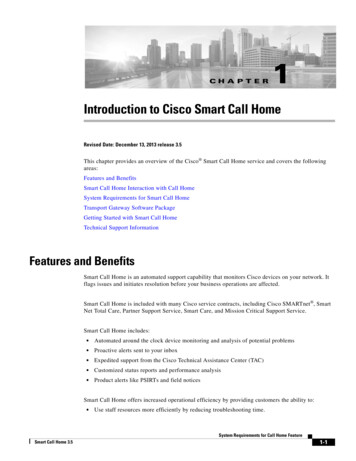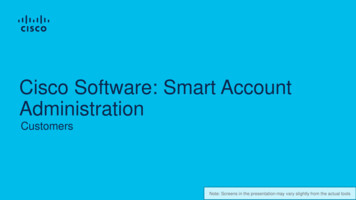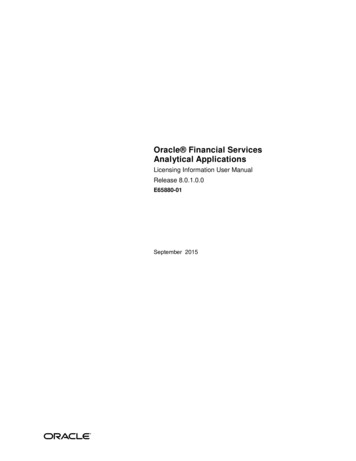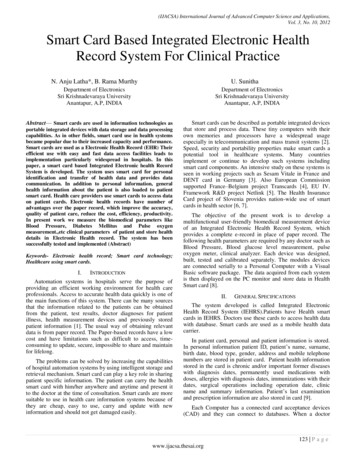
Transcription
Smart Financial Services Organizations:Leveraging the Private Cloud to Gain a Competitive EdgeRobert Worden, M.A.
Smart Financial Services Organizations: Leveraging the Private Cloud to Gain a Competitive EdgeTABLE OF CONTENTSAbstractPage 3Top Needs of Financial Services OrganizationsPage 3Private Cloud to Drive Industry LeadershipPage 4Why HP/TIBCO Silver FabricPage 5ReferencesPage 72
ABSTRACTSmart financial services organizations (FSOs) are moving quickly to adopt private cloudcomputing. Private clouds may be hosted by a third party or built on premise at the FSO.In this paper we assume an on-premise private cloud deployment with equipment andsoftware located in the FSO’s data center. FSOs most prone to adoption of private cloudcomputing include organizations such as banks, brokerage houses, insurance companiesand credit card companies. These organizations are confronted by common needs and theprivate cloud offers a solution to meet them.In order to meet their needs FSOs must transform their information technology (IT)systems to move beyond a physical IT environment to a virtual one, the private cloud. Thistransformation enables FSOs to become more customer-centric, cost effective andproductive by leveraging cloud technology. Once this transformation is complete, a privatecloud solution will provide the FSO with capability to meet its biggest needs quickly andserve the customer and overall business better.TOP NEEDS OF FINANCIAL SERVICES ORGANIZATIONSFSOs have many common wants such as improving financial results, productivity,customer loyalty, regulatory compliance and updating aging IT infrastructure. U.S. banksfor instance need to focus on margins. Banks are reporting higher quarterly net incomethan a year agoi, but competitive operations appear to be affecting profitability. Theinsurance industry needs greater profitability as well with net income among 99 percent ofU.S. insurers down in three of five major insurance categoriesii The Durbin Amendmentadds an additional regulatory burden causing banking and credit card revenues todecrease up to 20 billioniii. And, a recent Gallup poll revealed that more than four-in-fiveivAmericans distrust banks, which generates a need for customer loyalty.Two additional key requirements that merit the exploration by financial servicesorganizations in today’s competitive financial services market: 1) the need to deliver ahighly personalized and customized application experience and 2) the need to dynamicallymeet rapidly changing consumer access patterns and demands with network agility.The Need for CustomizationApplication customization in the cloud is the process of tuning an application to meet thespecific need of the customer quickly. The drive to customize stems from the need to becompetitive, cost effective, develop additional revenues and be attuned to customerrequirements. According to Frost & Sullivan’s 2011 Cloud User Survey, financial servicescompanies indicated that they either currently use the cloud for proprietary applicationsor plan to do so within the next two years. Custom applications received the highestvinterest for cloud services among twelve FSO applications surveyed.The competitive edge gained by FSOs through customization of cloud applications isevident in two ways. First is the ability develop and deploy an enterprise application in3
Smart Financial Services Organizations: Leveraging the Private Cloud to Gain a Competitive Edgeminutes or hours, not days or months as required in a physical environment. Second, it’sabout meeting the specific customer requirement on the first try, building applicationvalue and customer loyalty while generating new and ongoing revenue streams.The Need for AgilityThe need for the agility is vital for the FSO. Agility in the cloud environment speaks to theability to be nimble and respond to changing dynamics quickly, and automatically. It’sabout creating new environments (storage, servers) in real-time as resource requirementschange, managing temporary environments, centrally managing distributed hardware andstandardizing on the processes need to make this all happen. It is absolutely critical to theFSO to be agile enough to keep current applications running at peak capacity and to beable to explore new applications as well.In a private cloud configuration, FSOs can also test new applications in parallel withexisting applications. The parallel test reduces the risk of launching a new application liveto the customer with errors, thus improving the value of the offer to the customer.Private Cloud to Drive Industry Leadership“Cost savings can beachieved by betterutilization andmanagement of existinghardware. Hardwarebecomes a service offeringand hardware sharing areality.”- Senior IT executiveLarge US bankIn a private cloud where servers, storage resources, and applications can be deployed inminutes, IT departments that focus on physical infrastructure to meet their business needsare wasting precious and limited time and money resources. The private cloud communityis leading the IT departments of FSOs into a new realm of cost and time effective ITservices delivery.Two companies at the forefront of market leadership are HP and TIBCO Software Inc.Together, these companies are driving the cloud industry forward with private cloudadvantages which include: Cost Effectiveness: Capital expenditures can be avoided or deferred as the cloudcan leverage existing IT infrastructure. Automated application management alsoreduces the need for additional labor resources to support the applications. Increased Agility: As additional infrastructure needs like storage emerge,provisioning rules of the system direct the platform to scale with demandautomatically, in real-time- a great time savings. Flexibility: The cloud service environment offers end users the ability to integrateapplications built on any major architecture into the cloud environment and scalethose applications on demand. Security: The integrity of a company’s data is preserved as the resourcessupporting the applications are not shared with other companies as in publiccloud architecture.4
No Trade Offs: In the cloud environment, it is possible to lower costs and increasequality due to the flexibility and agility of the cloud architecture. One need nottrade quality for cost of service delivery or vice versa.Why HP/TIBCO Silver FabricHP and TIBCO have a unique and industry leading relationship that has led them tocombine the best of their cloud capabilities to support private cloud deployments andongoing management. When running on HP’s CloudSystem Matrix, TIBCO’s Silver Fabricsoftware provides the FSO with core capabilities to manage infrastructure and supportedapplications simply.“Silver Fabric providestwo broad benefits to anIT organization thatcannot be overlooked: costsavings and agility”- Senior IT executiveLarge US bankHP Cloudsystem Matrix is a private cloud infrastructure solution that integrates hardwaresuch as HP Blade servers together with software to support application develo pment,monitoring and changes requirements. The solution provides automatic and rapiddeployment of server and storage infrastructure.TIBCO’S Silver Fabric is a platform for migrating applications to a private cloud within theFSO’s data center. Silver Fabric integrates easily with legacy hardware and software andenables automatic provisioning and management of cloud applications. Silver Fabric’s keyasset is its flexibility to work with the majority of well known development platforms.When used in conjunction with HP CloudSystem Matrix, TIBCO Silver Fabric can solve thegreatest needs of the FSO. Key advantages enabled by this combined offering include: Easy and Elastic: Automated application provisioning and activation makes newdeployments easy. And, when greater resources are required, the system willscale them on demand to meet the need. Low Risk Deployment: New or modified applications run initially in a parallel ITenvironment. This parallel environment, or stepping stone, reduces the risk ofmoving an application directly to the cloud. Platform Support: TIBCO and HP support development platforms such as .Net,IBM Websphere and Oracle Weblogic among others. Total Cost of Ownership (TCO): The ability to share resources among applicationsincreases resource utilization for cost savings. HP reports potential TCO savings canviincrease by as much as 56 percent.ConclusionFinancial services organizations can gain a competitive advantage and meet their criticalbusiness needs by adopting a private cloud solution. Before any organization undertakes amove to the private cloud, it requires an examination of the capabilities of potentialpartners and how their solution will meet their unique needs. The tight integrationbetween HP and TIBCO offers FSOs flexibility, elasticity, security and control of5
Smart Financial Services Organizations: Leveraging the Private Cloud to Gain a Competitive Edgeinfrastructure and applications by employing leading technologies to meet their needs andgain a competitive edge.6
REFERENCESiFederal Deposit Insurance Corporation (FDIC), “Quarterly Banking Profile”, FourthQuarter, 2011.iiNational Association of Insurance Commissioners (NAIC), “Industry Snapshots”,December 31, 2011.iiiSpitler, Rick and Kyriacou, Lee. “U.S. Banking: A Challenging Road Ahead,”Novantas Review, July 2011.ivWood, John and Berg, Paul. “Rebuilding Trust in Banks,” Gallup ManagementJournal, 08 August 2011. ustbanks.aspx#1, retrieved 24 November 2011.vFrost & Sullivan, “ 2011 Cloud User Survey: The Who, What, and Why ofInfrastructure as a Service Usage” August 2011.i.7HP White Paper, “The Business Case for HP BladeSystem Matrix” Doc #4AA25606ENW, July 2011.
Silver Fabric integrates easily with legacy hardware and software and enables automatic provisioning and management of cloud applications. Silver Fabric's key asset is its flexibility to work with the majority of well known development platforms. When used in conjunction with HP CloudSystem Matrix, TIBCO Silver Fabric can solve the











